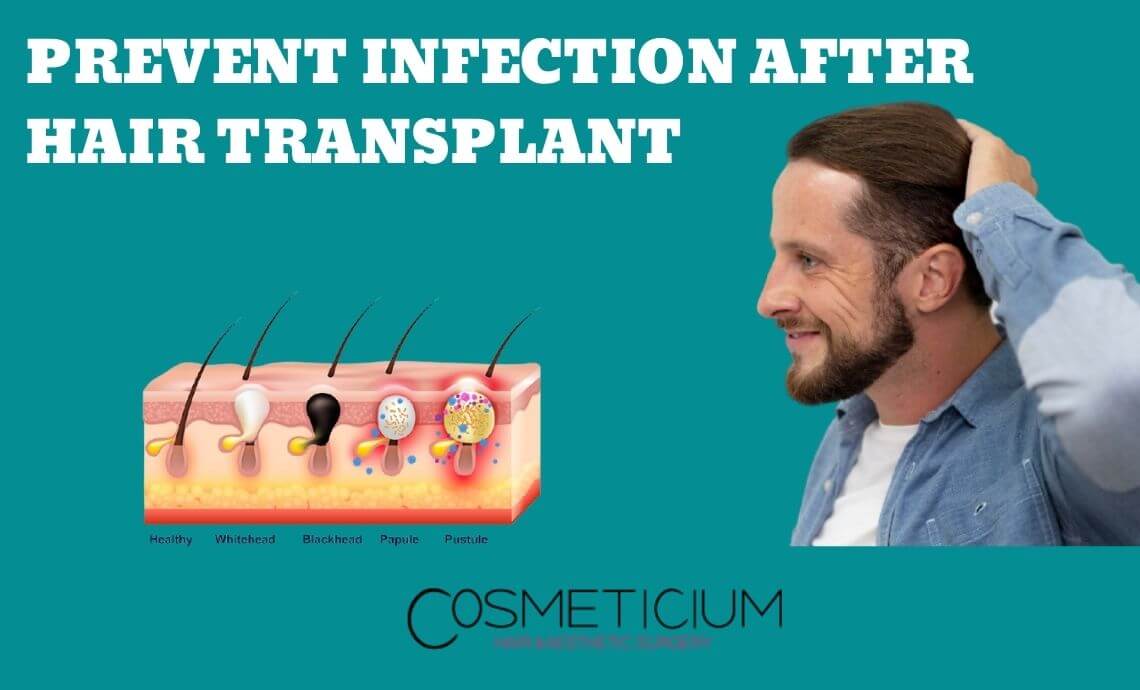The most effective solution for permanently lost hair is undoubtedly hair transplantation. With this procedure, you will achieve permanent results and regain your old appearance. Success rate of the procedure, which is intensely preferred today, is extremely high. However, hair transplant infection due to different reasons can reduce this rate. Well, in which cases does infection after hair transplant occur? Does it affect the success rate? All risks and solutions are in our article.
Table of Contents
How Does Infection Occur?
Infection risk can be quite common in unsuccessful hair transplant operations. Cells are very close to each other in skin, which is an important barrier for microbial penetration. Such that, in virtue of this extreme closeness, it is impossible for any bacteria to breach through skin. Although skin acts as a clear set for bacteria with its perfect structure, sometimes we break this set for different reasons.
This barrier is damaged due to different reasons such as occurred scratches on skin, having surgery and tattooing. Thus, a passageway for bacteria that can cause infection is opened.
Open wounds are a serious risk for infection to occur. Infection after a botched hair transplant draws attention as a serious condition that may occur for this reason.
How Common Are Hair Transplant Infections?
The risk of infection after hair transplant is extremely low. However, it should not be forgotten that there is a risk in the end. All surgical operations have this risk. Even if an operation is very small or insignificant, this risk does not disappear. Your risk differs depending on how quickly your scalp heals after this operation and how quickly your wounds recover.
Different measures can be taken to minimize the risk possessed by an open wound. With right precautions, it is possible to eliminate these risks to a large extent. Before moving on to the precautions to be taken, let’s examine the following symptoms to make you correctly diagnose infection risk.
9 Main Symptoms of Infection
In case of post-hair transplant infection, some symptoms will also occur. With these, you can quickly notice existing problem and take necessary precautions. Post-operative symptoms and some common complications can be listed as follows:
- Long duration bleeding
- Severe pain
- Swelling and redness around infected area
- Severe reaction to anesthesia
- Constant hiccupping
- Pustule formation in follicular region
- Wound necrosis in donor area
- A hairline that would be considered bad
- Incorrect healing process
If you notice the symptoms mentioned here, you should contact your doctor directly, thinking that the relevant area may be infected. Thus, the problem can be intervened before it causes permanent damage.
Read Also: 7 Big Risks in Hair Transplantation Clinics Without a Doctor
Does Infected Hair Transplant Follicle Affect Results?
A hair transplant infection does not cause any permanent damage if diagnosed early and as long as grafts and follicles remain steady. With early diagnosis and right treatment, this process can be overcome without any problem. However, in case of late treatment and if the person does not pay attention to the issues that require attention, the result may be adversely affected.
If infected areas are not intervened in a timely manner, it will be inevitable to damage grafts and follicles in relevant area. In such a case, success rate of the operation may decrease directly and a disappointing result may occur.
Infected Hair Transplant Risks
Infected hair transplant means that success rate of the operation decreases when necessary treatment is delayed. However, the negative aspects are not about operation results. In addition, it poses a serious risk to person’s overall health.
Due to infection after hair transplant, hairline may deteriorate and an additional procedure may be needed. Infection of donor area can make scar visible. Afterwards, it may cause weaker hair growth there. In addition to all these, loss of a healthy scalp can even cause unexpected hair loss.
Read Also: How Can an Unsuccessful Hair Transplantation Be Corrected?
How to Avoid Infected Hair Transplant Follicle?
Bacteria and other microorganisms are dangerous enemies for human body. It is extremely important to pay attention to all recommendations given by doctors in order to fight these nonvisible enemies. Regarding infected hair transplant problem, expert and experienced doctors recommend the following:
- Never touch your scalp.
- Avoid dusty environments, keep relevant area clean.
- Do not try to scrape or collect scabs that will form on your scalp over time. It should come off on its own with washing.
- Do not scratch your scalp
- Avoid exercises that will cause you to sweat (1 month)
- Do not go swimming (1 month)
- Follow care instructions after the operation
- Do not consume cigarettes and alcohol
- Strictly follow your doctor’s instructions
CONCLUSION
With you, we have shared some important things that you should avoid. The main cause of infection after hair transplant is unhealthy clinics that do not take adequate hygiene measures. In order to prevent this risk from the very beginning, it is very important to have hair transplantation only at hospitals which have international standards and certificates.
As Cosmeticium, we take all necessary precautions to prevent hair transplant infections in all operations we perform. All necessary information about the subject is given to you.
Thanks to all this, we ensure that you leave here happily with high success rate. Contact us for more detailed information about the subject and for all your questions.
Fill In The Form Below To Get Answers To All Your Questions About Hair Transplant Infection From Our Doctors Within Hours. (FREE)

